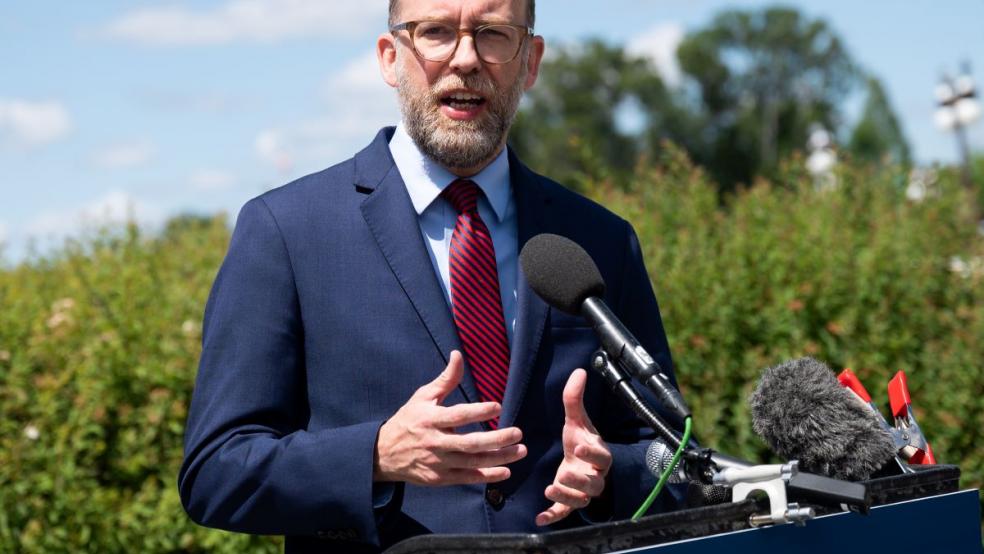House Republicans are calling for significant spending cuts as they seek to balance the federal budget within 10 years, but so far, they have failed to provide a plan showing how they might reach that goal, even as they have taken some of the largest budget items such as Social Security and Medicare off the table for future negotiations.
Russell Vought, who ran the Office of Management and Budget under former President Donald Trump, is hoping to provide the budget blueprint that would allow Republicans to move toward their objective. As Jeff Stein, Josh Dawsey and Isaac Arnsdorf of The Washington Post report, Vought, who now leads a conservative think tank called the Center for Renewing America, has emerged as one of the leading intellectuals in the GOP while providing “a seemingly inexhaustible stream of advice” on budgetary matters, including guidance on how to use the debt ceiling as leverage to shrink the federal government.
Former House Speaker Newt Gingrich, who in many ways pioneered the current Republican approach to federal spending and is advising Speaker Kevin McCarthy (R-CA) on the burgeoning showdown over the debt limit, told the Post that Vought is a key figure. “Russ is the guy conservatives go to for intimate knowledge of how the federal budget works,” Gingrich said. “He understands an enormous amount of federal budgeting, and that makes him a very big player.”
The plan: In a 104-page memo, Vought outlines potential spending cuts at virtually every federal agency that would slash spending while leaving the major social welfare programs alone. “I’m tired of this focus on Social Security and Medicare, as if you’re climbing a mountain and can’t make any progress on that mountain until you go to the eagle’s nest on the top,” Vought told the Post. “You take these cuts to the American people, and you win.”
On the path to a balanced budget, the document outlines massive reductions in federal programs, many of which serve lower-income households. Medicaid would see $2 trillion in cuts over 10 years, while the Supplemental Nutrition Assistance Program, commonly known as food stamps, would lose $400 billion, and Head Start funding would be cut in half.
Many of the programs targeted for cuts have a common theme. By the Post’s count, the Vought memo mentions the word ‘woke’ 77 times, using it to describe programs at agencies as varied as NASA, the National Institutes of Health and the FBI.
“America cannot be saved unless the current grip of woke and weaponized government is broken,” Vought writes. “That is the central and immediate threat facing the country — the one that all our statesmen must rise tall to vanquish. The battle cannot wait. However, this woke and weaponized regime requires the resources of taxpayers to flourish and can be starved in order to dismantle it.”
Could the plan work? Critics of Vought’s blueprint argue that is unrealistic and cannot provide a path to a balanced budget. Washington Post columnist Catherine Rampell notes that, among other problems, the plan assumes the economy will start growing much more rapidly as government spending is slashed, thanks to a surge in labor force participation driven by the cuts. “It shows gangbusters growth of 3.1 percent this fiscal year alone,” she writes. “For context, that’s more than 10 times the pace of growth projected by the nonpartisan Congressional Budget Office (0.3 percent).”
Other critics question just how much money can really be saved by targeting ‘wokeness.’ One Republican official told the Post that while Vought is a budget expert, “he’s selling conservatives a fantasy, which is achieving a balanced budget without cutting anything popular.” The official added, “We’re going to balance the budget by ‘ending woke?’ Give me a break.”
Casey Mulligan, who served as chief economist for the Council of Economic Advisers in the Trump administration, said that Vought’s approach might help establish the principle that discretionary spending needs to be slashed, even if it fails to balance the budget. “He’s taken this very interesting position that: Yeah, we need to get entitlement spending under control. But Washington — the agencies — need to take a haircut first,” Mulligan told the Post. “The agencies are a fairly small amount of money, but the symbolism of it — I think he’ll be successful with that message.”
Still, it seems unlikely that the Vought plan could get the budget anywhere close to balanced, even if he could unify Republicans behind what would probably be very unpopular spending cuts. “As a purely rhetorical ploy, they may be able to get away with it,” William Galston, a former Clinton administration official at the Brookings Institution, told the Post. “As a matter of arithmetic, it’s ridiculous.”



